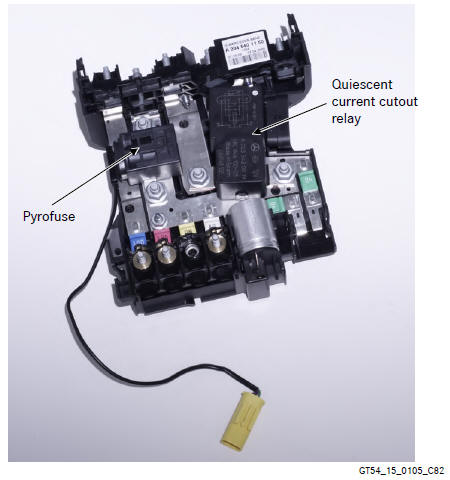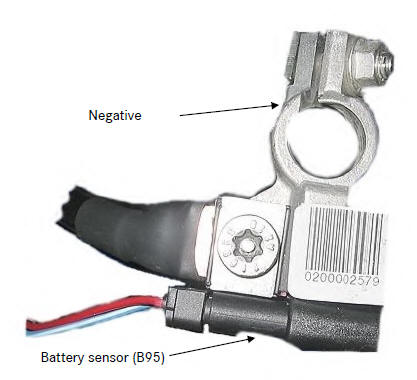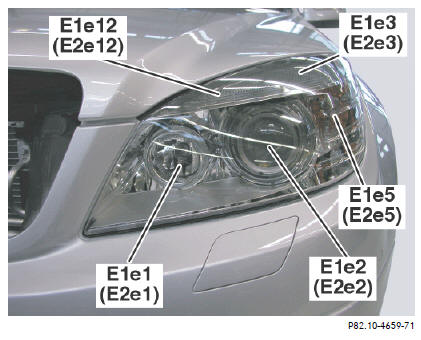Mercedes Benz C-Class (W204) 2007 - 2014 Training Manual: On-Board Electrical System Management
The on-board electrical system management is integrated into the rear SAM control unit with fuse and relay module (N10/2) and is responsible for ensuring the supply to all electrical consumers, based on need and situation, as well as the vehicle's ability to start. The following components play a decisive role in the implementation of the on-board electrical system management:
Prefuse box F32 with
Information for Service The components in the prefuse box cannot be replaced individually. Prefuse box F32
Battery sensor (B95)
Exercise The battery sensor (B95) and the rear SAM are responsible for the on-board electrical system management. Installed directly at the negative terminal, the battery sensor measures voltage, current and temperature at the on-board electrical system battery and uses these to evaluate the battery's status. The following measures can be introduced to stabilize the on-board electrical system:
The battery sensor is also used for checking the quiescent current. Quiescent current cutout relay Exercise The quiescent current cutout relay is a bistable relay. It separates the consumers and components at circuit 30g. If the ignition is turned off or the ignition key is removed, the quiescent current switch relay opens after 6 hours or it opens if the on-board power supply voltage falls below 11.8 V. The quiescent current cutout relay is actuated by the rear SAM. Pyrofuse Exercise A pyrofuse, which disconnects the starter and alternator line from the battery in the event of a collision, is used in the prefuse box. It is activated by the ARAMIS control unit (airbag). Illumination There are three different light systems to choose from for model series 204:
Also installed for all three light systems is a light sensor, which permits the automatic exterior light control via the two SAM control units. In the basic lighting version, the mirror turn signal and the center high-mounted brake lamp are designed as LEDs, in vehicles with intelligent light system (ILS) the rear turn signal lamps are also fitted with LEDs. The brake light has a "contactless" brake light switch and is designed as an adaptive brake light. The familiar functions of emergency light and substitute light are also implemented. In vehicles with ILS the following extended functions are also implemented:
Information for Service The control units for bi-xenon headlamps can be replaced separately. |
See More:
Mercedes-Benz C-Class (W205) 2015 - 2021 Owners Manual > Display messages: Lights
Display messages Possible causes/consequences and ► Solutions Intell. Light System Inoperative * The Intelligent Light System is defective. The lighting system continues to function properly without the functions of the Intelligent Light System. Visit a qualified specialist workshop. Check Left L ...
Mercedes-Benz C-Class (W205) 2015 - 2021 Owners Manual
- At a glance
- Digital Operator's Manual
- General notes
- Occupant safety
- Opening and closing
- Seats and stowing
- Light and visibility
- Climate control
- Driving and parking
- Instrument Display and on-board computer
- Voice Control System
- Multimedia system
- Maintenance and care
- Breakdown assistance
- Wheels and tires
- Technical data
- Display messages and warning/indicator lamps





